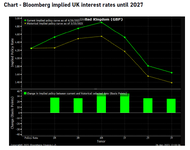How can you say to people who want security going for a 5 year fixed to be careful. Ultimately you shouldn’t worry about what rates might or might not do, there is no guarantee. You should always pick a fixed rate around your circusmstances. Rate reductions predictions are actually being pushed further out than previosuly thought
If you are staying where you with no anticipated life events (extra borrow, move home, receive lump sum etc) then fixing in for 5 years could be the right product for you
If you get to two years time and rates havent gone down, and have maybe slightly higher, and you feel you wouldn’t want to deal then fixing in longer would preferable even if rates came down, because the priority it protect against rising interest rates
Anyone who picks their rate based on predictions of rates would be unwise to do so, as the financial crash, covid and the mini budget have all proved in the last 15 years
Because you're securing a high rate, which you can't get out of without paying an ERC (if ERC's apply, which they have done on every 5 year fixed I've had). That might be safety till the end of 2023 when rates are expected to peak, but likely won't be in years 2-5 (when rates are expected to be lower than now). So if people have plans on remortgaging again, moving, downsizing, end up losing jobs, split up with partners, get forced to sell etc then they will get penalised by ERC's (likely far more than any savings made). The short-term safety net is also a long-term risk, depending on how world circumstances are expected to change. You can port 5 year fixed's though, in some circumstances, I've done it twice, you save the ERC's, but still pay the same rate etc.
It's each to their own though, everyone's circumstances are different, but the consensus of outlook on rates (inflation and base rate) from economists is very consistent.
Of course, a counter to my own point is that rates could just keep going up for 24,25,26 etc, but who thinks that would happen? Nobody? If it did happen the entire housing market would crash and values probably drop significantly.
Everywhere in the developed world has practically shown inflation has peaked (at local highs), and practically everywhere is predicting rates to drop again when the inflation rate drops (like it's already doing), but there's a lag on this of around 6 months.
If people are happy with the ERC risk, as well as the chance of interest overpayment risk for 2-5 then that's fine, but they need to be made aware that this is the most likely scenario.
Nowhere is predicting rates to be higher in 2 years, than they are now, and the curve would likely be on a downwards trajectory, not like now where it's expected to go up for maybe 6 months (so any mortange provider now will insure against that rise). A 2-year fixed would end up as roughly the same payments, and then they could take another 2 year fixed or do whatever suits at the time.
The mortgage providers themselves know rates will come down (or won't go up more than expected), this is why 5 year fixed's are slightly cheaper than 2 year fixeds, if they thought rates were going up and/or staying up, they 5 year fixed would be a couple of percent higher. 5 year fixeds have hardly ever been cheaper than a 2 year fixed, this is probably a good clue as to why they might be a bad idea for some people.
The financial crash is a good example, when I bought a house in 2008 nearly every adviser was saying to get a 3-5 year fixed deal. It didn't make any sense to me and my circumstances, as everyone was forecasting rates to soon drop, and then they dropped further than most expected. I took a discount variable and within two years the rate was at 0.5% (about 4% lower), and then once the discount period ended I just fixed for 2 years at the low rate.
There are pro's and cons for all types of mortgage, but you need to look at what is expected to happen in each of the timeframes.
Like for now, if I was a first-time buyer who had the money to buy, I wouldn't even bother buying now, I'd just rent for one to two years and wait for prices to drop, and mortgages to drop, just build up more LTV too etc. If I was in a no or low stamp duty band I would possibly even think about selling, renting and then buying again in 1-3 years.


